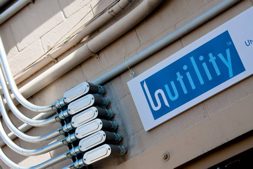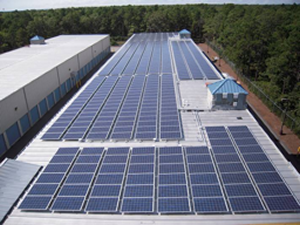"We are not the Utility;
we are the Unutility!"
by Desiree Moyer

Solar energy seems like an easy, environmentally friendly solution for our energy needs – especially on sunny Cape Cod. But ideal sites for harvesting solar energy are rarely owned by businesses able to afford the upfront cost involved with installing a large photovoltaic array.
On the other hand, there are private financial resources looking for opportunities to fund renewable energy. And the new Solar Renewable Energy Certificates (SRECs) make it financially attractive for everyone involved.
Unutility Electric was formed to solve this conundrum. Unutility Electric, LLC is a women-owned company with a unique business model. We develop and own photovoltaic arrays atop businesses on Cape Cod.
Green Electricity
The solar arrays owned by Unutility Electric produce green electricity, which is sold at a discount to the businesses at the sites. Without this model, the businesses would be purchasing all of their electric power from the utility company.
In the United States, our standard electricity is currently generated from a mixture of 48.2% coal, 21.4% natural gas, 19.6 % nuclear, 6% hydro, and 1.1% petroleum. Biomass, solar, and wind make up less than 3% of the current generation. (This is according to the U.S. Energy Information Administration, Form EIA-923, "Power Plant Operations Report.")
Among the renewable sources, hydroelectric power dominates. While hydro is renewable, it is not necessarily environmentally friendly. There is no hydro-electric power generation on Cape Cod, although New England does have some small hydro generators. The U.S. "imports" hydro-electric power from Canada, but it's unlikely that significant increases in domestic hydro generation will be developed.
Personal Investment
As an avid environmentalist, I wanted to, as the old saying goes, "put my money where my mouth is." I made a serious commitment, but it was a calculated investment. This endeavor has worked well for me both emotionally and financially. As an owner of solar electric generation, I take advantage of tax credits and depreciation while enjoying a predictable cash flow year after year.
 |
Why solar? Why now?
The Green Communities Act, passed in 2008, and its subsequent regulations enacted in 2009, revolutionized renewable energy in Massachusetts. These policies provide the means for innovative business models for renewable energy development. The financial incentives are particularly compelling for solar.
While all renewable energy projects enjoy generous tax avoidance and electricity savings, solar electric systems participate in a unique program. These systems create valuable SRECs. The certificates are "minted" as the system produces electricity; the more electricity it makes, the more certificates are awarded.
The certificates are then sold in a regulated market. Currently, certificates are sold for more than three times the retail value of the electricity itself. (See side-bar for more details on this remarkable program.) The tax advantages and ongoing revenue from electricity and SREC sales make owning solar projects a responsible financial move.
Woman Owned
Between Katharine Reynolds and myself, we own over 50% of the original Unutility Electric, LLC. The first Unutility Electric project is a 381-panel array atop the Orleans Marketplace in Orleans, which went online in March 2010.
Two other, even larger, projects have been recently completed at Anchor and Flagship Self Storage facilities in Mashpee. Each has strong ownership shares by women and each has significant green energy production.

These large solar arrays would not have been accomplished without the commitment and support of visionary women of Cape Cod. The Unutility Electric model for implementing solar delivers on many levels. It meets the needs of building owners wishing to make their operations more green, it provides the Cape with more green jobs, it keeps our energy dollars close to home, and it improves the air quality for all on Cape Cod.
We are thrilled with what we have accomplished so far. And we've only just begun.
Photographs for this article by Mark Zelinski www.mazphotography.com
Understanding SRECs
Solar Renewable Energy Certificates (SRECs) are new to Massachusetts for 2010, but have been successful in other states, such as New Jersey, for the past two years. The Massachusetts Department of Energy Resources (DOER) developed and oversees the program here.
The idea behind the program is to not use tax dollars to drive the development of solar, rather to force the traditional electric power producers to support the effort.
Here's how it works: the electric power suppliers must purchase a quota of these certificates or pay a penalty. If they sell electricity in Massachusetts, they must buy a certain number of these SRECs.
On the other side, solar projects that qualify for the program create the certificates as they generate their renewable solar electricity (one certificate is awarded for every 1,000 kilowatt hours).
How do the solar folks sell their certificates to the power companies? The trading of the certificates is handled by a variety of brokers and public auctions. Currently, the certificates are selling for between $400 and $500. Remarkably, this revenue is worth about three times the value of the electricity itself and will continue for 10 years.
Solar owners are assured of a viable market for these certificates; the DOER has control over the quotas, penalty prices, and minimum price and is committed to achieve a 30% annual growth of solar installations.
The SREC program provides the owners of new solar developments with a significant and predictable cash flow for years to come.

Desiree Moyer is an Environmental Engineer currently working for the Environmental Protection Agency. She oversees the munitions investigation and clean up at the Massachusetts Military Reservation on Cape Cod.
Desiree is an avid kiteboarder and surfer and is also one of the founding Team Riders of the Cape Cod Wahines. The Cape Cod Wahines is a grassroots organization dedicated to getting women and girls into wind, wave, and kite surfing. Desiree currently resides on Cape Cod.
For more information about Unutility visit: www.unutilityelectric.com
